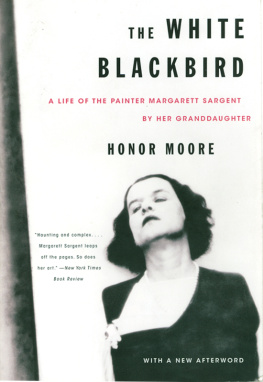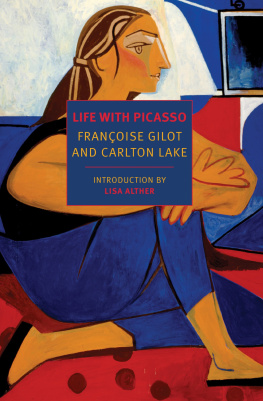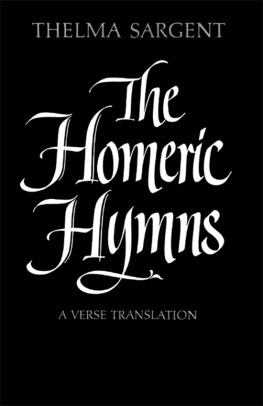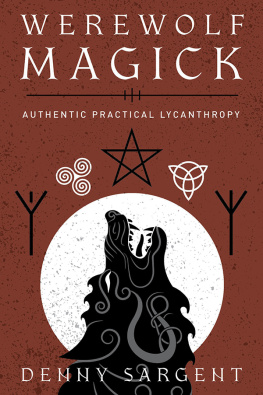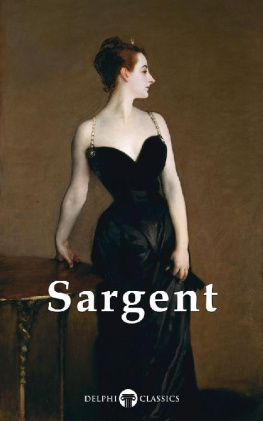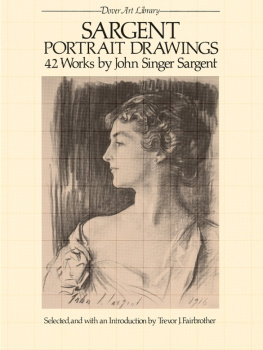Praise for The White Blackbird
Moore offers no easy answers.... It is a virtue of this autobiographical biography that it succeeds in evoking the unfathomable nature of a personality.
New York Review of Books
Thanks to her granddaughters sensitive reconstruction of her life, Margarett Sargents memorable personality and extraordinary sensibility have been given a second chance of surviving oblivion.
Wall Street Journal
Moving, penetrating, and true; it evokes the destiny of women like Zelda Fitzgerald. Well written, well researched, and insightful.
Franoise Gilot
Honor Moore has painted a vivid picture of an era. Most fabulous of all is the picture of that tormented woman wandering through life searching for truth and beauty that she could see and feel but couldnt get her arms around.
Ben Bradlee
Moore translates Sargents paintings into rich word-portraits ... her writing is delicious. She describes a culture in which establishing connection with the pleasurably erotic pulse of creativity requires exactly the same risk as jumping off a high cliff.
Womens Review of Books
Never has the life of a woman artist been rendered with such exquisite detail, with such excitement, insight, and compassion. Anyone who cares about triumphand the psychic costof making art must read this book.
Louise DeSalvo
Like so many women of her time, Margarett Sargent has been lost to history: a great artist who abandoned her art and left no story. But she left a granddaughter who has here searched out and movingly recounted that haunting life.
Carolyn Heilbrun
A wonderfully readable and revealing study of a rich but unfulfilled lifefascinating not only in its portrait of the artist as a woman of wealth, position, and ultimately, of despair, but also for its insight into the complex fabric of interlocking Bohemian and Brahmin society of the times. This is a real achievement.
Linda Nochlin
Ambitious and searching.... The White Blackbird is as rich in casually telling detail as only an authentic family album could be. By dint of both her privilege and her talent, Margarett Sargent occupied a charmed place in the demi-monde and the avant-garde, and her life offers a panoramic view of an era.
The Nation
ALSO BY HONOR MOORE
Memoir
The Bishops Daughter
Poems
Red Shoes
Darling
Memoir
Play
Mourning Pictures
Edited by Honor Moore
Poems from the Womens Movement
The Stray Dog Cabaret: A Book of Russian Poems
Amy Lowell: Selected Poems
The New Womens Theatre: Ten Plays by
Contemporary American Women
Honor Moore
THE WHITE
BLACKBIRD
A life of the painter
Margarett Sargent
by her
granddaughter

W. W. NORTON & COMPANY
New York London
Copyright 2009, 1996 by Honor Moore
All rights reserved
Printed in the United States of America
First published as a Norton paperback 2009
Page 379 constitutes an extension of this copyright page.
Frontispiece. Margarett Sargent in Paris, 1928.
(Photograph by Berenice Abbott)
For information about permission to reproduce selections from this book, write to
Permissions, W. W. Norton & Company, Inc., 500 Fifth Avenue, New York, NY 10110
For information about special discounts for bulk purchases, please contact
W. W. Norton Special Sales at or 800-233-4830
Manufacturing by Courier Westford
Book design by Francesca Belanger
Production manager: Devon Zahn
Library of Congress Cataloging-in-Publication Data
Moore, Honor, 1945
The white blackbird: A life of the painter Margarett Sargent
by her granddaughter / Honor Moore.
p. cm.
Originally published: New York: Viking, 1996.
Includes bibliographical references and index.
eISBN 978-0-393-344370
1. Sargent, Margaret, 1892-1978. 2. PaintersUnited StatesBiography. I. Title
ND237.S313M66 2009
759.13dc22
[B]
2009005666
W. W. Norton & Company, Inc., 500 Fifth Avenue, New York, N.Y. 10110
www.wwnorton.com
W. W. Norton & Company Ltd., Castle House, 75/76 Wells Street, London W1T 3QT
1234567890
If you bring forth what is within you, what you bring forth will save you. If you do not bring forth what is within you, what you do not bring forth will destroy you.
The Gnostic Gospel of Thomas

Sundays of course were different
I wore plumes...
(18921908)
Margarett and her father
at Wareham, c. 1903
For Margaret Vernon
Contents
A section of photographs follows page 148.
Color plates of paintings by Margarett Sargent may be viewed at
www.margarettsargent.com.
Y OU WILL HAVE A BOSOM like your grandmothers, my mother says. I am eleven, standing with her near the brass-fixtured highboy on the second-floor landing of our house in Indianapolis. My mother is black-haired, olive-skinned, and lean. My brother teases me for being too pale, too roundwhite and gooshy, white and gooshyand I reassure myself: I am like my grandmother Margarett. She had black hair and very white skin. Like mine. She was not called pale. She was an artist, and she was called wonderfully fair.
I was flat-chested until I had children, my mother says, pulling my first bra from the underwear drawer. I envy you your bosom. At thirteen, alone in the mirrored dressing room, I cup new breasts with small, wide hands: a bosom like my grandmothers. The bosom grows. And the buttocks. Whats that behind you? my mother jokes as we walk together down the street. Fat. Fat as Margaretts face in that photograph she sent from Brittany in 1953. It was the only picture of her in our house. A fat face. Too fat for the Breton headdress. Too sad to look at for long. I finger the red felt jacket from Saint-Malo. It lasts. Grandma sent it from France! She taught me to draw. To want to write letters in strange-colored inks on unusual paper.
It could have been any day in the years before the truce my mother and I reached when I left home. It happened a lot in the years my figure was becoming like my grandmothers. Standing in the twenties-vintage maroon bathroom so the other children wont hear, my mother and I scream at each other for reasons having to do with hairSweetie, keep it away from your face! And she pushes it from my face. And I yank her hand away. Silence, then, There, thats lovely, the side of my face revealed when the hair goes behind the ear. Bitch, under my breath. My room is messy. A slap across my facepunctuation to the fights with my mother. One long fight. She is cool. I am not. Margaret was not.
Margarett is dead now, and so is my mother. I am left with the reports of war correspondents. All the time, my brother says. She screamed at you. Screamed. And my sister: Once I asked Mom, Why are you so mean to Honor? What did she say? Nothing. And my father: My psychiatrist told me to stay out of it: mothers and daughters ... Twenty years later, my brother: She was fighting something back in you. Definitely. Tamping it down. It was her mother in you. She saw Margarett growing in you.
My mother at the telephone when telephones were black: Grandmas in the hospital again. Whats wrong with her? Mentally ill. My mother stands there touching her head. It means her mind is sick. Her brain? The feeling inside my own head. Nothing in my mothers voice tells me her fear. Fifteen years later, I hold a white telephone as my mother tells me she herself is going into a sanitarium: depression. Margaretts sad face. Oh, yes, her brain. Her mind. Oh, yes, I understandthat kernel of pain in my own head. A feeling starts to hurt and you have no words for it.
Next page
